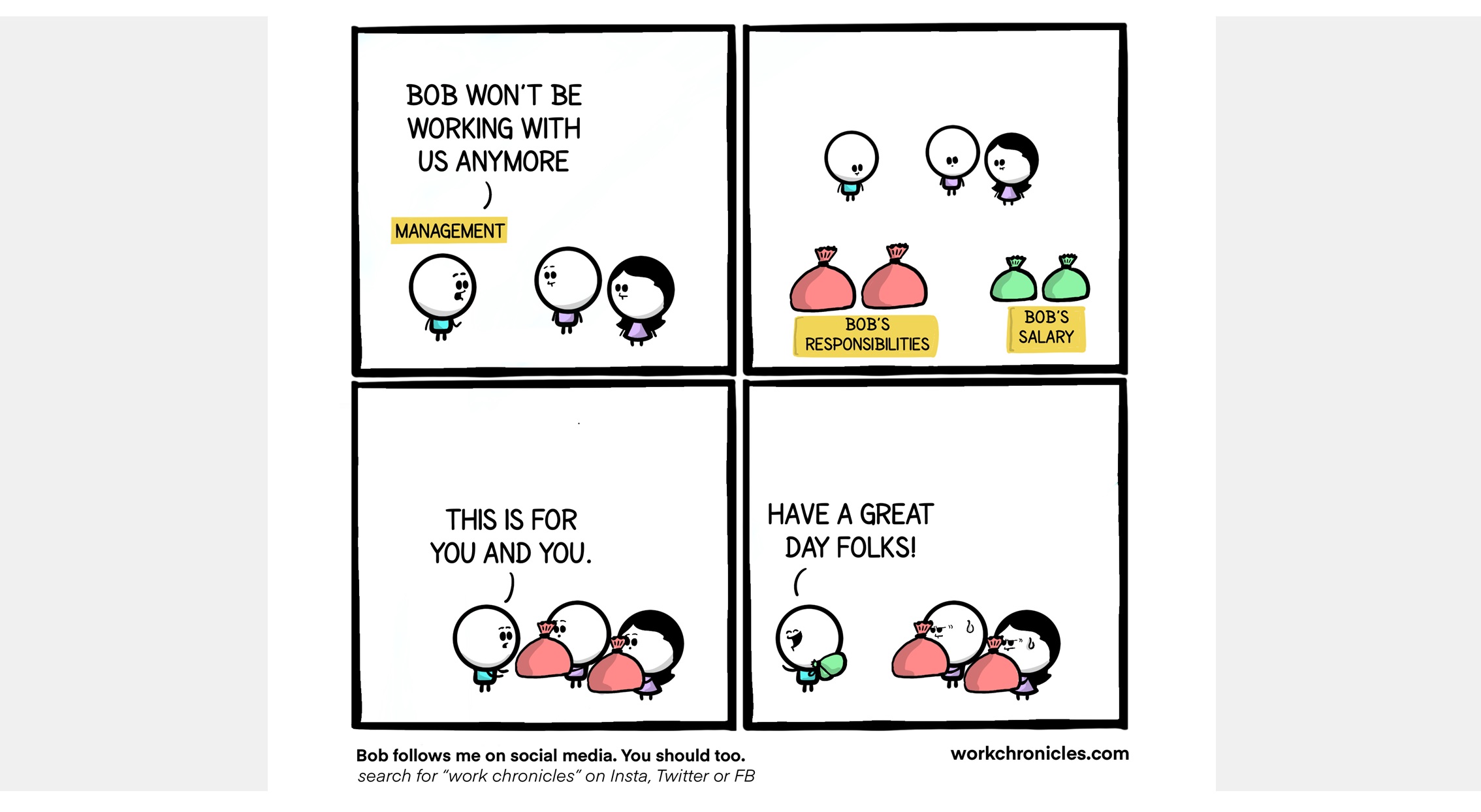Introducing the hybrid job: part one thing, part another, the Cockapoo of careers, employment's answer to the reversible duvet, a hastily bodged-together Frankenjob, think of it as you will.
These two-part titles - Director of Finance and Resources, Head of Fundraising and Marketing - are turning up across the charity sector in ever greater numbers, but what's behind it, what are the implications, and how should you handle a hybrid if you have to? Read on as we investigate...

Jobs, as you'll know if you've ever had one, have a way of expanding over time. Which is very often this way (courtesy of the excellent Work Chronicles):

A familiar scenario for many in the charity sector, we suspect, and for just about anyone working for an organisation of any size. Not least because, as younger generations (and many of their elders) know only too well, the reward for excelling at your job is no longer a promotion or pay rise, which apparently went out with the ark, free tuition, and any realistic prospect of home ownership.
No, the reward is of course more work, on top of (not instead of) your original work, and thus your responsibilities grow. Although this isn’t necessarily or always a bad thing, to be scrupulously fair.
However, what’s exploding across the sector right now (not literally) is a slightly different, more official kind of job expansion that typically comes with a new, double-barrelled name: Head of Finance and Resources, Director of IT and Operations, Head of Fundraising and Communications.

Why now?
In most cases, these double-aspect roles are two existing jobs knocked together, often due to restructuring of the relevant areas. As such, it’s no surprise to see them proliferate during times of economic gloom, when the cost-cutting imperative elbows all other concerns out of the way.
From an employer’s perspective, it’s easy to see the appeal: savings need to be made, and this seems a relatively painless way of doing it.
After all, why have a plain old Director of Finance when you could have a Director of Finance and Resources, Finance and IT, Finance and HR? The world’s your overstretched, underpaid oyster, and done at the right time (ideally when one of the roles is being voluntarily vacated) it’s a good opportunity to reduce headcount without having to lay anyone off.

There are other potential positives too: in order to perform both parts of the new role at once, postholders will generally have to delegate a fair chunk of each to their teams, giving others an opportunity to grow. In small organisations particularly, where people are used to having to wear several hats, it might also provide much-needed progression for senior talent who otherwise have nowhere to go.
And while it’s generally a cost-cutting measure, amalgamating smaller roles can also be a way to prevent them becoming redundant altogether, helping to retain valuable – if not continuously required – skills.

So what's the problem?
If we’ve learned one thing from bingeing Netflix dramas in our – let’s call it ‘loungewear’ – it’s that there’s always a price, and in this case, much of it paid by the postholder struggling with a challenging workload, more responsibilities, and often a whole new arena in which they’ll be expected to know their stuff.
As a result, many report feeling overloaded, while some see it as taking advantage of their naturally giving disposition, one that happens to be fairly common in the charity sector.
It doesn’t help they’ve rarely had much say in the matter – restructures rarely come with an ‘Or, y’know, you can just stay as you are’ option, so people often feel obliged to accept the dual role, but may not necessarily be thrilled about it.

Nonetheless, they'll do their best to do the job as well as they always have, and there lies another hazard.
Delivering 100% in both capacities is unachievable, and while some find a level they can live with by delegating as much as they can, others will struggle to stop themselves trying to do everything, generally to the detriment of their health, wellbeing, social and family life, and more.
In some ways, it’s better they can’t, because if you can do two roles perfectly well, cost-cutting logic says ‘why not three?’ Why not four? Pretty soon we’re in a world where the only options are a) no job, or b) a job where you do the work of six people. Many would argue we’re already well on the way there.

Two for the price of one?
Still, at least staff can be sure that all this extra work and responsibility will be appropriately rewarded, right?
Well, in most cases, to a degree: no-one expects their hybrid-role salary to come anywhere close to the sum of its constituent parts (which is just as well), but there will usually be at least some degree of uplift to acknowledge the greater demands of the role. Unless, of course, it’s a role in marketing, where seemingly no increase in workload or responsibility need be recognised nor reflected in pay. How about pizzas on Friday instead?
Unsurprisingly, marketers – who might be able to party like it’s 1999 but would quite like to stop being paid like it – often feel rather short-changed and move on before long, be it for financial reasons or increasingly, burnout. But in that, they’re far from alone.

Yet there’s a sting in the tail for employers when they do. New hybrid roles are almost inevitably shaped by the particular strengths, abilities and experience of the individual doing them. Which is fine until they move on, leaving a uniquely-shaped gap in two or more teams that can be exceptionally difficult to fill.
Every extra string that’s been added to their bow limits the candidate pool exponentially, and the prospects of finding someone who can simply take over in every capacity are slim, to say the least. It might even be that their particular dual role is only viable when you start with someone who’s already doing half of it.

How to handle a hybrid
Ultimately though, with any significant improvement in the economy still likely to be some way off, Frankenjobs seem unlikely to be killed off any time soon. So, here's what we suggest if you find yourself face-to-face with one:
Push for as much input as you can into how the role is defined
Be realistic with yourself about what you will and will not be able to deliver, and establish clear boundaries for the role
Don’t attempt to do everything, or burnout beckons: learn to delegate a lot more than you probably do now
And if you’re thinking of creating one:
Listen to those who’ll be doing the work and ensure they’re well supported
Have realistic expectations: tasks may be easily manageable in themselves, but managing them all simultaneously may not be
Crucially, make sure that the extra effort staff are putting in is properly recognised and rewarded. Yes, it will cost a little more, but it’s always significantly cheaper and less disruptive than having to replace them.
Although if it comes to that, or you run into any other unexpected horrors with a hybrid role, we can recommend an excellent specialist recruiter who’d be happy to help…
Team HH

| | For more information on hybrid roles, or advice on dealing with a current situation of this kind, please speak with one of our specialists. Meanwhile you can also find this, along with news of other charity recruitment trends and the latest rates for around 200 charity sector positions, in the new Harris Hill Salary Survey 2024. | | |
| |  | | |
text
| |
t

-

Opportunity for all
Find out how we’re working to deliver more diverse, equitable and inclusive recruitment…
-

Recruiting a charity CEO?
Our executive recruitment specialists have an exceptional record of successful CEO, chair, trustee and…
-

Charity sector salaries
Check out the market rate for your charity role in the latest Harris Hill Salary Survey.













